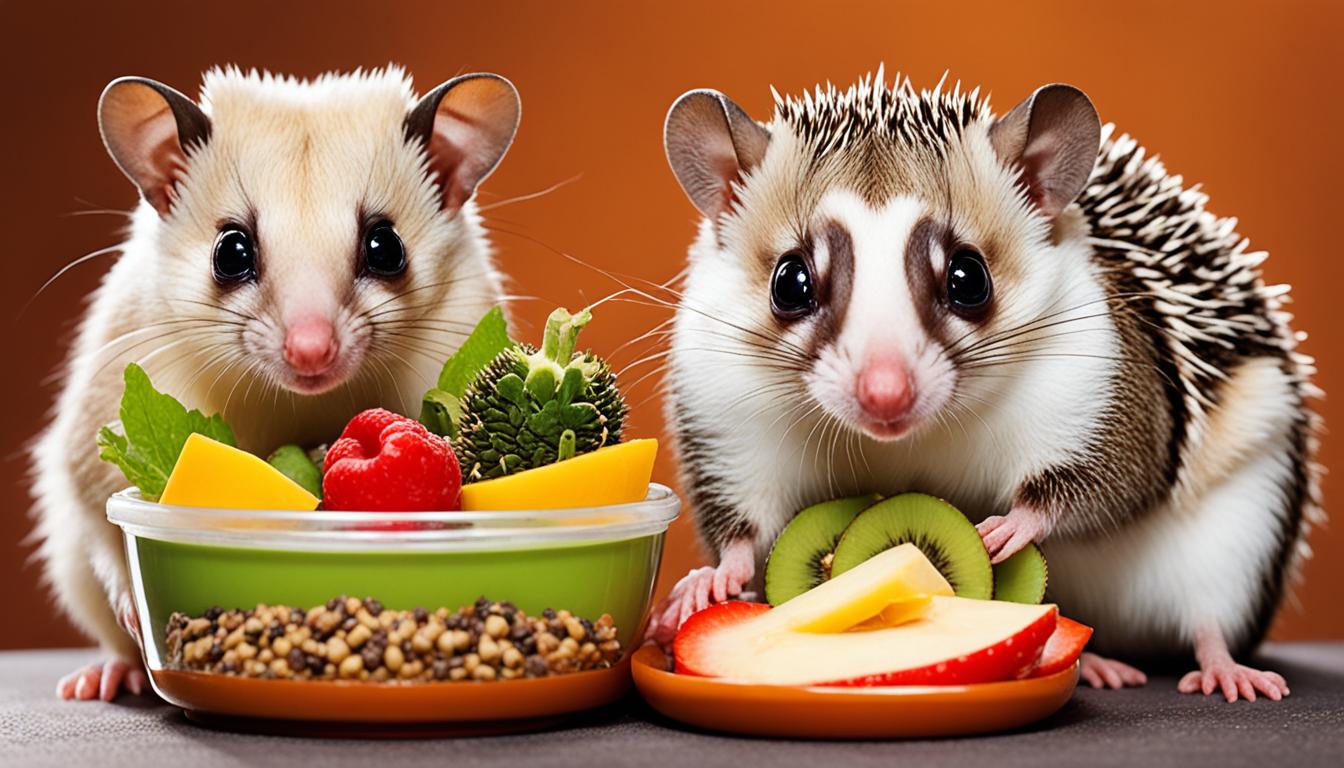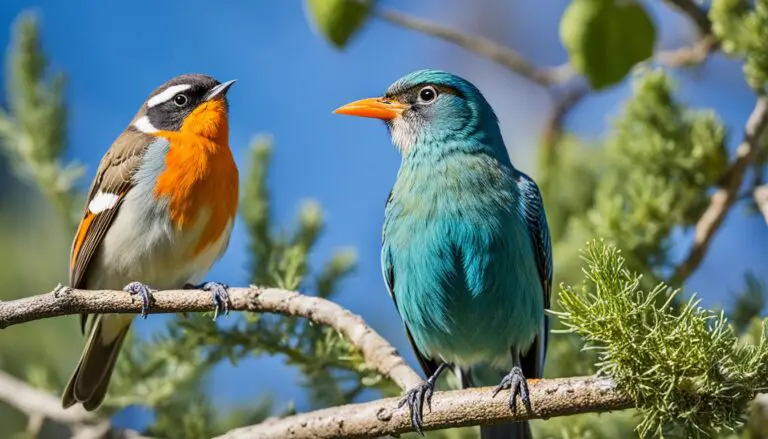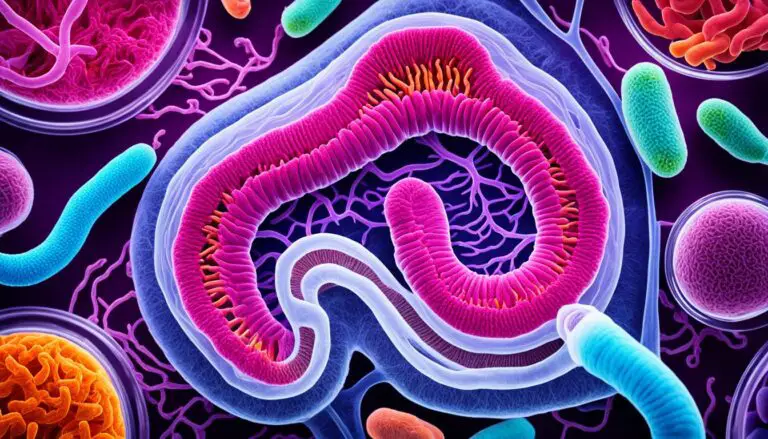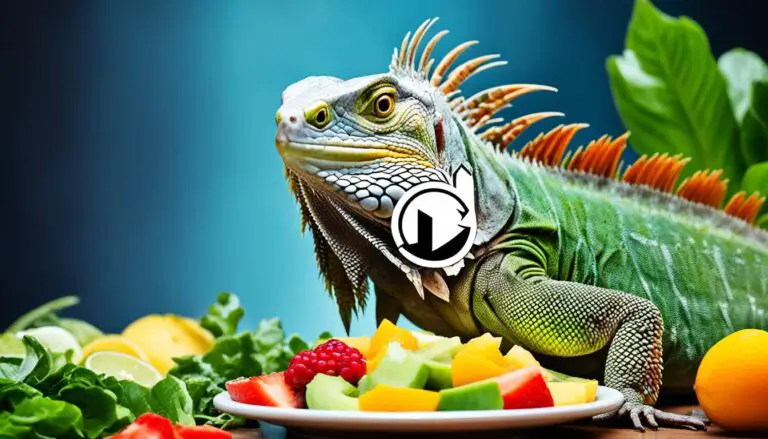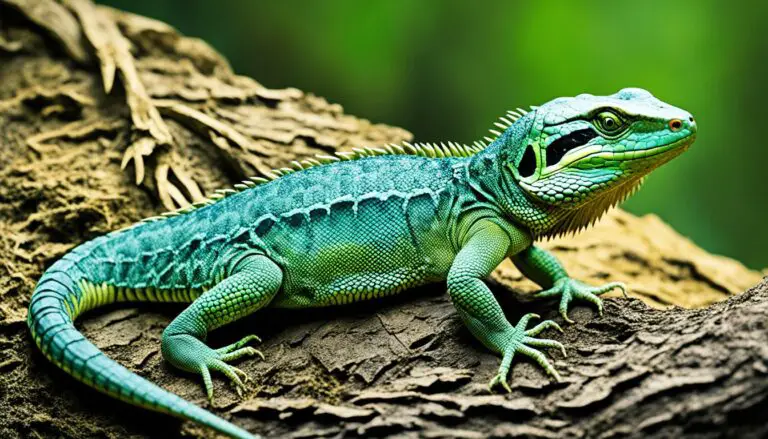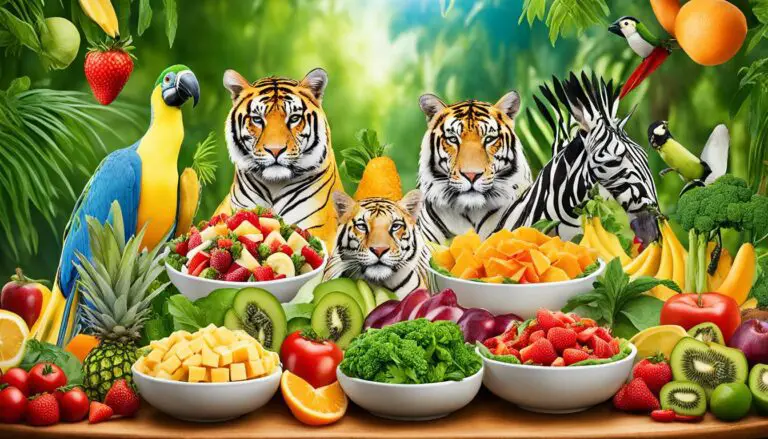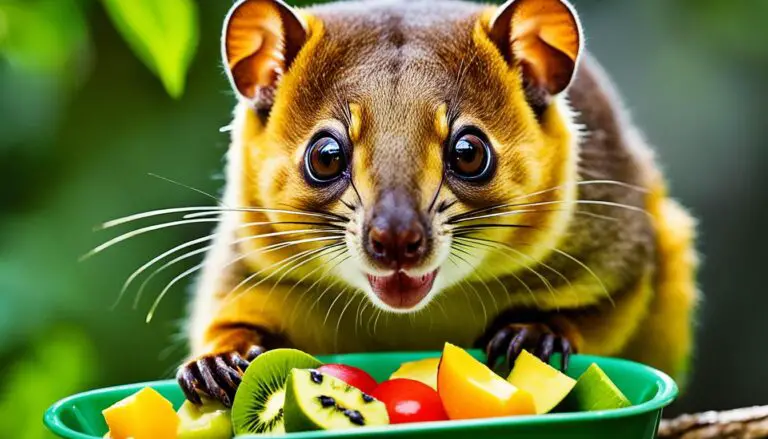Comparative Nutrition for Exotic Pets Needs
The study of nutrition for zoo and exotic animals is always changing. It aims to better see what these pets need in their diet. This field looks at their eating habits in the wild, mixes in research, and studies what foods will be best. The goal is to make specialized diets for each type of exotic animal.
Comparing what we know about diets for pets like cats or dogs can help start the process. But, the real test is how well the exotic pet does over time. Success in growth, the ability to have babies, and a long life are key measures. They show if the diet is working like it should.
This article will look at different aspects of feeding exotic animals. We’ll explore what to think about in diets, challenges, and how to fix them. You’ll also learn how research on what foods best suit exotic pets helps take care of them.
Key Takeaways:
- Comparative nutrition is key in figuring out what exotic pets need to eat.
- We start by using what we know about food for pets like cats or dogs.
- How we feed them and the types of food are crucial for these pets.
- Exotic animals might have issues like too much iron or not enough vitamins. These must be considered in their diets.
- Studying their nutrition helps keep exotic animals, even those at risk, healthy.
Factors to Consider in Exotic Pet Diets
Creating a diet for exotic pets needs careful thought. Important factors include nutrient needs, the pet’s health, and what the diet contains. The National Research Council (NRC) sets minimum nutrient levels for usual and lab animals. But, exotic species might need more.
To give exotic pets the best, consider their health, age, and what they do. This means looking at their unique needs. Vets and nutritionists can make a diet that provides everything the pet needs to thrive.
Zoos and similar places usually use a diet that keeps animals healthy. But, some animals need more, like during breeding or to help with health issues. These extra diets might have different nutrients or supplements.
Remember, making a diet for exotic pets isn’t simple. Always work with a vet or nutrition expert for the best advice. They can make sure the diet is just right for your pet’s special needs.
Nutrient Requirements
Figuring out what exotic pets need can be hard and is often based on educated guesses. Still, NRC guidelines are a good place to start. They talk about what nutrients the pets should get, like proteins, vitamins, and minerals.
Physiological Status and Body Condition
For exotic pets, diets should match their health and shape. Is the animal growing, reproducing, or getting over an illness? Such things show what the pet needs. We also look at the animal’s weight to see if it’s okay or needs some changes to its diet.
Diet Formulation
Making a diet involves picking the right foods, how to cook them, and what extras they might need. The food’s taste, how well it gets digested, and what nutrients it has are important. Different pets might need fresh fruits, meats, or special pet food.

When designing diets for exotic pets, we must understand their nutrition, health, and shape. By keeping these in mind and seeking help from exotic pet experts, we can ensure our pets get the best nutrition.
Dietary Considerations for Exotic Pets
Diet is key for exotic pets’ well-being. The right food is crucial for their growth and health. To do this, we must be aware of certain feeding needs. Here are important tips for exotic pet diets:
Food Quality
Good food quality is vital for exotic pets’ health. Make sure their food is fresh and mould-free. Choosing top-notch foods avoids health problems from bad nutrition.
Feeding Methods
How we feed them depends on the animal’s needs. Psittacines, like parrots, do well on pelleted diets. This ensures they get all the nutrients they need. Pellets stop them from eating only on calcium-poor seeds.
Calcium Requirements
Calcium is a must for many exotic pets, like reptiles and birds. They need it for strong bones and metabolic health. Insects can be fed calcium-rich diets before given to pets, helping them get their calcium.
Obesity Prevention
Obesity is a big problem for exotic pets. Too much food can harm their health and cut their life short. Be careful not to overfeed them. Also, make sure they get enough exercise. This will keep them fit and healthy.

Preventing Obesity in Exotic Pets
To sum up, food quality, the right methods, and calcium are key for exotic pets. Also, preventing obesity is crucial. These steps help your exotic pets live a long, healthy life.
Nutritional Challenges and Solutions for Exotic Pets
Exotic pets, like black rhinos, deal with unique nutritional issues. These need special care from experts. A big problem is getting too much iron from human-managed diets.
The first task is to figure out what each exotic pet needs in their diet. Specialists look for any lack of vitamins or minerals that could harm the pets. Nutritionists, with help from vets and experts, do detailed research on the animals’ bodies. This leads to effective solutions.
Special diets are made by studying what nutrients and processes each exotic pet needs. These diets are meant to fix iron issues and keep the pets healthy and living long.
Nutritionists also watch for any missing vitamins or minerals in the pets’ food. They make sure to solve any diet problems that could hurt the pets. This work is key to keeping exotic pets well.
Solutions for Nutrient Challenges
To meet exotic pets’ needs, their diets must be just right. Here are some key ways to do this:
- Vitamin and Mineral Supplementation: If a pet’s diet lacks a certain nutrient, a vet may suggest adding it. This is to keep the diet balanced and the pet healthy.
- Dietary Modifications: Sometimes, changing what the pet eats and how much can fix diet problems. This ensures the pet gets what it needs to thrive.
- Regular Monitoring: Checking the pet’s health often, with tests and look-overs, is crucial. It helps spot and fix diet issues fast to keep the pet well.
Work in exotic pet nutrition is always moving forward. Experts keep learning and working together. This ensures pets get the diet they need to be well.

“Proper nutrition is crucial for exotic pets. Solving diet problems, like iron overload or missing nutrients, is vital for their health and happiness.” – Dr. Jane Richards, Exotic Animal Nutritionist
Next, let’s delve into the exciting field of research on what exotic animals need in their diet.
Comparative Nutrition Research in Exotic Animals
Understanding what exotic animals eat is key to their health. Research on their diets leads to better care. It helps us know what to feed them to stay healthy.
This kind of research teaches us about more than food. It shows us how their bodies work. This helps us keep them healthy and happy for longer.
Identifying Commonalities and Surprises
Animal experts look for what exotic animals eat the same. Finding these patterns gives us important clues. But they also watch for differences, which can teach us new things.
Studying hard-to-find animals helps save them. Knowing what they need to eat is crucial. It helps them remain strong and able to have babies. This is important for their survival.
“Through comparative nutrition research, we gain a better understanding of the dietary needs of exotic animals, which not only improves their health but also contributes to their conservation.”
The Importance of Animal Physiology
Research looks at how animals digest food and use energy. Knowing this helps create better diets for them. This is an important part of taking care of exotic animals.
Researchers also look out for what animals might be missing in their diets. They then make special plans to give them what they need. This keeps the animals in good health.
Overall, this kind of research is very important. It helps us learn how to take care of exotic animals well. It plays a big role in protecting them and keeping them healthy in captivity.

Case Study: Nutrition Research for Rhinoceros
Rhinoceros nutrition research shows us how vital vitamins and minerals are for their health. Black rhinos are especially important to this discussion. They can get too much iron from the food we give them in captivity.
Nutritionists and veterinarians work hard to understand what rhinos and other exotic animals need to eat. Their studies tell us the best ratios and types of nutrients rhinos should have. This helps keep the animals healthy and full of life.
Having too much iron can be bad for rhinos. It might cause health problems if not kept in check. The experts aim to create diets that stop too much iron. They also make sure the rhinos get all the vitamins and minerals they need.
This picture is a strong reminder of why we need to study rhinos’ diets. These creatures need special foods to stay healthy. They are big and amazing, needing precise nutrition to thrive.
Thanks to nutrition researchers, we can spot and fix problems like iron overload in rhinos. Their work is essential for the health of these amazing animals. They’re helping keep rhinos safe for the future.
Nutrition Research for Iron Overload Prevention
To avoid iron problems, experts design special diets for rhinos. These foods have less iron but still meet the animals’ needs. They also use special substances that help the rhinos get rid of extra iron.
By studying hard, nutritionists figure out just the right amount of these substances. This research keeps the rhinos from having too much iron. It’s good for the rhinos’ health and helps keep their numbers steady.
Vitamin and Mineral Research: Efforts to Ensure Optimal Nutrition
Scientists also look into what vitamins and minerals rhinos need. They find out what could be missing from the animals’ diets. This helps them make sure the rhinos get everything they need to stay well.
They study how different vitamins and minerals work together for the rhinos’ bodies. This lets them create diets that are just right. They are making sure these grand animals are as healthy as can be.
The Future of Rhinoceros Nutrition: Continued Research and Conservation
The rhino nutrition study shows how much we value these big animals. Nutritionists and researchers keep working to make sure rhinos have the best diet. Their efforts keep the rhinos strong and healthy.
Learning more about rhino diets helps all kinds of animals. It opens the door to better care for them. Together, we can help ensure these fantastic creatures are here for the long run.
Practical Applications of Comparative Nutrition
Comparative nutrition research helps caretakers of exotic pets. It allows them to understand what these unique animals need. This knowledge ensures that exotic pets thrive in captivity.
Exotic pets have very particular dietary requirements. Researchers use comparative nutrition to craft diets just for them. They think about the animal’s natural diet, how their mouth and stomach work, and how they grow. This creates meals that are similar to what the animal would eat in the wild.
Comparative nutrition also pinpoints what nutrients different exotic pets require. This lets veterinarians and owners make diets that are spot-on. Getting the diet right helps prevent health troubles down the line.
“Understanding the dietary needs of exotic pets is crucial for their overall health and well-being. Practical nutrition applications make it possible to give these animals diets that fit them perfectly. This leads to better health and a longer life in captivity.”
This field of study is also key in keeping exotic pets healthy. It can help prevent and manage conditions like calcium issues or too much iron. Knowing these risks helps keep pets in the best health possible.
And here’s the best part: it can prevent problems like obesity. By choosing the right food and keeping an eye on their pets’ weight, owners can keep them healthy. This means a better life for the animals and less worry for their caretakers.
Key Benefits of Practical Nutrition Application for Exotic Pet Care:
- Promotes overall health and longevity
- Prevents nutrient deficiencies and imbalances
- Manages and reduces the risk of specific nutrient-related disorders
- Helps prevent obesity and maintain a healthy body condition
- Enhances the overall well-being and quality of life for exotic pets
Comparative nutrition is a treasure trove for those who care for exotic pets. It equips them with the knowledge needed to keep their pets healthy. This approach supports the well-being of these animals during their whole lives.
The Role of Nutritional Support in Exotic Pet Treatment
Nutritional support is crucial for exotic pets dealing with anorexia and cachexia. These conditions can lead to serious health issues like weight loss and muscle wasting. By looking into their nutrient needs, we can help these animals get better.
Designing a special diet is key when pets won’t eat. This plan features the right food or supplements, given in a way that fits the pet’s health. A vet should always guide this process.
Improving a pet’s diet always needs to be done carefully, with a vet’s help. It’s important to watch how the pet reacts and adjust things as needed to get the best results.
The Importance of Nutritional Support in Anorexia
“Exotic pets often stop eating when they’re stressed or sick. Giving them the right food is crucial for their recovery.” – Dr. Jane Simmons, Exotic Animal Specialist
Ignoring anorexia can lead to unhealthy weight loss. Nutritional support steps in to give pets the nutrients they’re missing. This might mean liquid meals or specialized foods that meet a pet’s unique needs.
Changing the way we feed pets may be necessary. Pets may do better with small, regular meals or food given through a syringe. We should pick a feeding method that helps the pet eat well while keeping them healthy.
The Role of Nutritional Support in Cachexia
“Cachexia can make pets lose muscle and get very thin. The right nutrition is key to helping them recover.” – Dr. Michael Roberts, Veterinary Nutritionist
Cachexia usually happens with ongoing health problems. Pets’ bodies can’t use the food they eat well, leading to muscle loss. Nutritional support in these cases aims to stop this process by supporting muscle growth and improving energy.
Plans to treat cachexia might include protein supplements and important fats. These are given to help pets’ bodies rebuild muscles and boost their immune system. The goal is to fight cachexia’s effects, making the pet feel better.
Nutritional Support as Part of a Comprehensive Treatment Plan
Fighting anorexia or cachexia needs more than just better food. A full plan should include vet care, any needed medicine, changes to the pet’s space, and help with behavior. This whole team approach is best for the pet’s health.
Keeping an eye on how the pet does is very important. We change the nutrition plan as we see the pet’s health change. The vet, the pet’s owner, and a nutrition expert all work together for the pet’s benefit.
Image depicting the role of nutritional support in exotic pet treatment.
| Benefits of Nutritional Support | Anorexia | Cachexia |
|---|---|---|
| Promotes weight gain and prevents further weight loss | ✓ | ✓ |
| Provides essential nutrients that may be lacking | ✓ | ✓ |
| Supports tissue repair and muscle regeneration | – | ✓ |
| Improves overall energy levels and well-being | ✓ | ✓ |
Note: “-” signifies that the benefit is not applicable to the specific condition.
Conclusion
Understanding what exotic pets need to eat is super important for their health and happiness. Studying which foods work best for different animals is critical. It helps experts give good advice to people who own exotic pets.
It’s crucial to feed exotic pets the right kind of food to help them live longer. Owners make sure they get all the nutrients they need by following diets made just for their species. Doing this keeps these unique pets in good shape.
Using a smart diet plan makes a big difference in an exotic pet’s health. It involves learning about the special food each type of animal needs. This way, owners can take great care of their special pets for a long time.
FAQ
What is comparative nutrition?
How are exotic pet diets formulated?
What factors should be considered in exotic pet diets?
What should I consider when feeding my exotic pets?
How can I prevent obesity in my exotic pets?
What are some nutritional challenges faced by exotic pets?
How does comparative nutrition research contribute to exotic animal health?
What is the role of nutritional support in exotic pet treatment?
What are the practical applications of comparative nutrition for exotic pets?
Why is species-specific nutrition important for exotic pets?
Source Links
- https://www.merckvetmanual.com/management-and-nutrition/nutrition-exotic-and-zoo-animals/nutrition-exotic-and-zoo-animals
- https://www.sciencedirect.com/science/article/pii/S1557506313000633
- https://news.cahnrs.wsu.edu/article/disney-scientist-to-share-how-nutrition-research-helps-exotic-animals-live-healthier-lives/
Peter Stones is the founder of Exotic Pets Place, the leading online resource for exotic pet care information.
With over 10 years of hands-on exotic pet ownership experience, he is deeply passionate about sharing his expertise to help others properly care for their unusual pets.
When he's not writing extensively researched articles or connecting with fellow exotic pet enthusiasts worldwide, you can find Peter at home tending to his own beloved menagerie of exotic animals.

